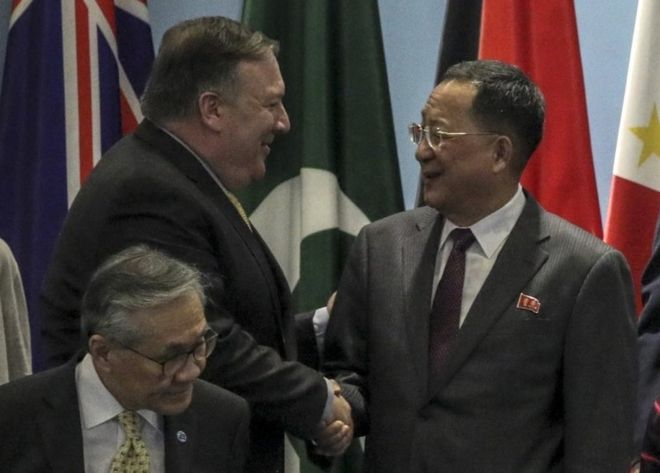North Korea calls US actions on nuclear programme 'alarming'
Sun 05 Aug 2018, 14:26:59

North Korea's foreign minister has called US actions "alarming" as tensions over the North's nuclear programme again flared.
Ri Yong-ho was responding to comments by US Secretary of State Mike Pompeo, who urged other countries to keep up sanctions pressure on Pyongyang.
A landmark summit between the two sides in Singapore in June saw the North agree to work towards denuclearisation.
But details remain vague and the UN says its nuclear programme continues.
At a regional forum, also in Singapore, Mr Pompeo said it was important to maintain "diplomatic and economic pressure" on North Korea to achieve "the final, fully verified denuclearisation".
Pyongyang is currently under a range of international and US sanctions over its nuclear programme and missile tests.
What was said at the latest meeting?
Singaporean Foreign Minister Vivian Balakrishnan said discussions about the North Korean nuclear programme at the Asean regional forum had been "brutally frank" but there was some good news.
"People acknowledge that there has been some progress and that the summit in Singapore did change the tone of the conversation and hopefully will help set the stage for a peaceful resolution of the outstanding issues," he told AFP news agency.
Mr Pompeo said he expected all nations to abide by sanctions, singling out Russia amid reports that it had potentially violated them by allowing thousands of North Korean labourers into the country. Russia has denied this.
In response, Mr Ri said that North Korea "stands firm" in its commitment made at the June summit between US President Donald Trump and North Korean leader Kim Jong-un.
He added: "What is alarming, however, is the insistent moves manifested within the US to go back to the old, far from its leader's
intention."
intention."
Mr Ri and Mr Pompeo only met face-to-face briefly, exchanging smiles, handshakes and a few brief words.
Also at Saturday's meeting, the US delegation delivered a letter from Mr Trump for Mr Kim. It is unclear what it contained.
What did the two leaders agree in June?
Mr Trump and Mr Kim made a commitment to work towards denuclearisation of the Korean peninsula, but it is still unclear how this could be achieved.
The commitment was included in a one-page agreement at the end of the summit aimed at reducing regional tensions.
Aside from the written agreement, the US president also announced that joint military exercises with South Korea, which he described as "provocative", would end.
What has happened since the summit?
Amid a tentative warming of relations since June, North Korea appears to have begun dismantling part of a key rocket launch site in the north-west, in compliance with a promise by Mr Kim to destroy an engine test site.
And at the end of July, the North returned to the US remains believed to be of 55 US troops killed during the Korean War, as agreed at the summit.
But reports last month based on US intelligence leaks suggest Pyongyang is still upgrading its uranium enrichment sites.
The reports are seen as undermining the spirit of the summit and casting doubt on the North's sincerity.
Then last week, unnamed US officials said that Pyongyang appeared to be building new ballistic missiles after spy satellites spotted continuing activity at one site.
A UN Security Council-commissioned report on Friday said North Korea was continuing its nuclear and missile programmes, violating UN sanctions.
It was increasing illegal ship-to-ship transfers of oil products and trying to sell weapons abroad, it said.
No Comments For This Post, Be first to write a Comment.
Most viewed from International
Most viewed from World
AIMIM News
Latest Urdu News
Most Viewed
May 26, 2020
Do you think Canada-India relations will improve under New PM Mark Carney?
Latest Videos View All
Like Us
Home
About Us
Advertise With Us
All Polls
Epaper Archives
Privacy Policy
Contact Us
Download Etemaad App
© 2025 Etemaad Daily News, All Rights Reserved.

.jpg)
.jpg)
.jpg)






.jpg)


.jpg)
.jpg)
.jpg)
.jpg)
.jpg)
.jpg)
.jpg)
.jpg)
.jpg)
.jpg)
.jpg)
.jpg)

















